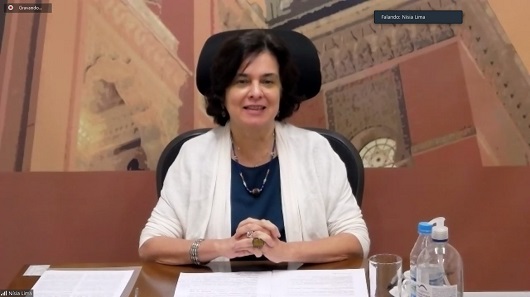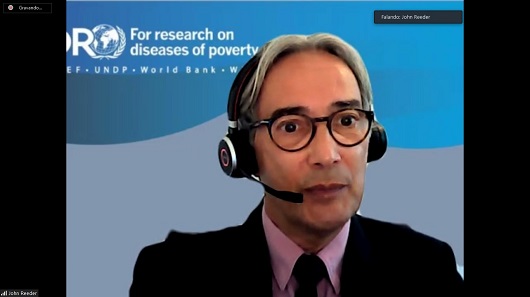Fiocruz formalizes alliance with WHO's Tropical Diseases Program
16/08/2021
Cristina Azevedo (Fiocruz News Agency)
The long relationship between Fiocruz and the Special Program for Research and Training in Tropical Diseases of the World Health Organization (TDR/WHO) gained a more formal character with the signing of the memorandum of understanding (MoU) this past Wednesday (August 11th). The document, which establishes the technical cooperation terms for the confrontation of tropical and neglected diseases, was signed during a virtual meeting between president Nísia Trindade Lima and John Reeder, director of the TDR. The event also celebrated the Foundation's election to the Joint Coordination Council of the program last June.
 At the meeting, the close partnership with the TDR was remembered, with mentions of members who have passed through the program, such as Carlos Morel - general coordinator of Center For Technological Development in Health (CDTS/Fiocruz) and who was director of the program from 1998 to 2003 - and Rodrigo Correa, vice president of Research and Biological Collections and former member of the Joint Coordinating Council from 2001 to 2006.
At the meeting, the close partnership with the TDR was remembered, with mentions of members who have passed through the program, such as Carlos Morel - general coordinator of Center For Technological Development in Health (CDTS/Fiocruz) and who was director of the program from 1998 to 2003 - and Rodrigo Correa, vice president of Research and Biological Collections and former member of the Joint Coordinating Council from 2001 to 2006.
The relationship between neglected diseases and social inequalities was highlighted. "That's why, at Fiocruz, we increasingly talk about neglected populations rather than neglected diseases", Nísia said, while Reeder recited one of his "mantras": "There is no research without development, and there is no development without research."
Five-year plan
Created in 1975, the Special Program for Research and Training in Tropical Diseases supports efforts to combat poverty-related diseases. Fiocruz has a long history of working together with the TDR through its WHO Collaborating Centers in Global Health and South-South Cooperation; in Public and Environmental Health; in Leptospirosis; in Drug Policy; and in Health Officials Training, among other activities.
Researcher at the CDTS, Claudia Chamas highlighted the work plan's main points established by the MoU for the next five years. Among them is the Implementation Research Toolkit (a standardization of processes so that results can be compared between countries) adaptation to Portuguese and the Massive Open Online Courses (open courses on the Internet). It is also planned to organize a TDR, Fiocruz and ministries of health of Portuguese-speaking countries network; to collaborate on research on snake bites; and to promote technical cooperation in Latin America with a focus on the Essence on Health Research initiative. "This is a great institutional victory that will allow the Foundation to expand the dialogue in the search for scientific and health solutions for neglected diseases and populations", she said.
Garry Aslanyan, partnerships and governance manager at TDR, recalled that this memorandum is the fruit of a relationship "that has solidified over the years." "Many at Fiocruz already work or collaborate with TDR. We will use this already established connection in the process", he stressed.
Paulo Buss, coordinator of the Center for International Relations in Health (Cris/Fiocruz), reminded that the Foundation adds important assets to this partnership. One of them is the National Public Health Institutes of the Community of Portuguese Language Countries (CPLC) Network, whose technical secretariat is at Fiocruz. It is joined by the National Public Health Institutes of Latin America Network and the Caribbean, and the Ibero-American Network of National Public Health Institutes, including Portugal and Spain.
The Ministry of Health's special advisor for International Affairs, Cristina Alexandre, linked the fight against neglected diseases to the 2030 Agenda, with the need to promote health and well-being, with "no one left behind". "We know that this cooperation action is important. About the CPLC, we will be together as part of the international advisory.
Spotlight on Science
For Reeder, the MoU signing will give "new momentum" to the relationship. "The work we do in the coming years will really make a difference", he said. He advocated the need for implementation research (the systematic study of methods that support the application) and highlighted the obstacles on the road to achieving universal health coverage and implementing actions "that we know can work, but don't."
 The TDR director stressed the need to strengthen research capacity, training capacity, and global engagement. "Solid learning and capacity building in countries is the best guarantee that they will be able to respond [to emergencies] that arise tomorrow", he said. And he reminded that with the COVID-19 pandemic, science finds itself under the spotlight. "When in the past has the chief scientist of the British government appeared on the newspaper's front page? People are paying attention to data and science. We can't let this get lost", he pointed out.
The TDR director stressed the need to strengthen research capacity, training capacity, and global engagement. "Solid learning and capacity building in countries is the best guarantee that they will be able to respond [to emergencies] that arise tomorrow", he said. And he reminded that with the COVID-19 pandemic, science finds itself under the spotlight. "When in the past has the chief scientist of the British government appeared on the newspaper's front page? People are paying attention to data and science. We can't let this get lost", he pointed out.
For Nísia, the memorandum signing is in line with the tripod on which Fiocruz is based: science, health, and education. She believes that actions in research and education with the virtual campus should be expanded with the partnership and stressed its importance for new researchers. "Learning in research is not exhausted in our training courses."
Nísia highlighted the balance in the collaboration with the TDR, in which both sides win. "These two facts [the choice for the council and the memorandum] bring responsibility, but, above all, create conditions for a more integrative and global vision of our action fields, taking into account the neglected populations’ necessities", she said. "This event signifies the meeting between the good science tradition, health and the populations' engagement in this process."


